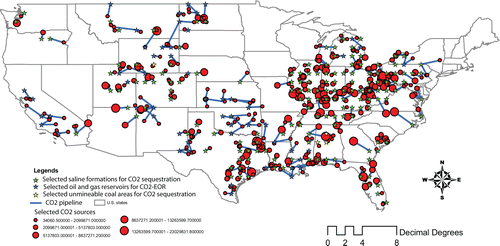Data-driven Process Systems Engineering Lab
Nationwide, Regional, and Statewide CO2 Capture, Utilization, and Sequestration Supply Chain Network Optimization
Industrial Engineering & Chemistry Research 2014

We design a CO2 Capture, Utilization, and Sequestration (CCUS) supply chain network with minimum cost to reduce stationary CO2 emissions and their adverse environmental impacts in the United States. While doing so, we consider simultaneous selection of source plants, capture technologies, capture materials, CO2 pipelines, locations of utilization and sequestration sites, and amounts of CO2 storage. The CCUS costs include the costs of flue gas dehydration, CO2 capture, compression, transportation and injection, and revenues from CO2 utilization through enhanced oil recovery (CO2-EOR). The dehydration, capture, and compression costs are derived using advanced modeling, simulation, and optimization of leading CO2 capture processes. Our results suggest that it is possible to reduce 50–80% of the current CO2 emissions from the stationary sources at a total annual cost ranging $58.1–106.6 billion. Furthermore, it is possible to generate $3.4–3.6 billion of revenue annually through supplying CO2 for CO2-EOR. Overall, the optimal CCUS supply chain network would correspond to a net cost of $35.63–43.44 per ton of CO2 captured and managed. Such a cost-effective network for CO2 management is attained due to (i) using novel materials and process configurations for CO2 capture, (ii) simultaneous selection of materials and capture technologies, (iii) CO2 capture from diverse emission sources, (iv) CO2 utilization for enhanced oil recovery, and (v) nationwide CO2 storage. Results for the regional and statewide (Texas) CCUS are also favorable.
Link to Publication